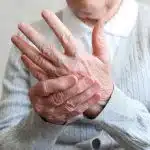
APDA’s Impactful Research in Parkinson’s Disease APDA proudly invests in the most promising clinicians and scientific projects focused on...see more

APDA’s Impactful Research in Parkinson’s Disease APDA proudly invests in the most promising clinicians and scientific projects focused on...see more

What is a disease staging system? A disease staging system is a framework used to describe the progression or...see more

Exploring Parkinson’s Disease’s Impact on Blood Pressure Control On a recent episode of APDA’s Dr. Gilbert Hosts, I spoke...see more

Exploring Parkinson’s Disease’s Impact on Urinary Dysfunction On a recent episode of APDA’s Dr. Gilbert Hosts, I spoke with...see more

Understanding Cognitive Fluctuations: What Do They Entail? Cognitive difficulties are a common symptom of Parkinson’s disease and can be...see more

Muscle weakness and Parkinson’s disease It is common for people with Parkinson’s disease (PD) to describe themselves as feeling...see more

The challenges of levodopa dosing and food intake I receive many Ask the Doctor questions about food intake and...see more

Webinar Recap: A Healthy Diet’s Influence on Parkinson’s Disease While there are aspects of our health that are beyond...see more

You will often hear that a person diagnosed with Parkinson’s disease (PD) first noticed something was “off” when a...see more

What is drug-induced parkinsonism? The motor features of PD are often (but not always) very easy to see via a...see more
Simple Email Signup v2 (Salsa replacement form)